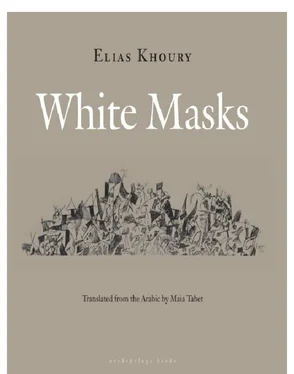“What’s over?” I asked.
“Nothing, nothing… I’m working,” he replied.
Then he grabbed a red towel and, after drying his face with it, wiped the mirror clean. He covered it with the towel and then just stood there, as though looking at his reflection.
Then he went to his room and began to rearrange all the bits of paper, the dough, and the severed limbs that were scattered over the floor. After laying them all out neatly in a corner of the room, he opened the wardrobe, took out his suit, got dressed, knotted his tie, and went out.
No, before he left he told me he was hungry. He stood in the doorway of the kitchen in his suit and tie and said, “I’m hungry.” I noticed how thin he’d grown, and that he looked older. So I sat him down in the kitchen to a plate of fried eggs, which he ate in complete silence.
“I’m going,” he said, getting to his feet.
“Where to?”
“Work.”
“But it’s three o’clock in the afternoon. You’ll go tomorrow.”
He stepped out of the kitchen, got his overcoat from the wardrobe, opened the front door, and hurried down the stairs. I never saw him again.
Initially, we thought he’d been kidnapped. I was really scared-I knew the man was at the end of his rope and might even harm himself. But there was nothing I could do but wait, he never came home, until that day when they showed up with him inside a wooden coffin and that overpowering smell. . Dear God, may we be delivered from evil… The Day of Judgment was upon us, the final reckoning. .
Actually, I didn’t do a thing with his belongings. While I was waiting for him I didn’t do a thing with them. I left everything — the shredded paper and the whitened heads and limbs — just as it was. I thought he’d be back and might get upset.
And now, I don’t know why, but I don’t dare enter the room. It smells of blood. . blood and cat! Maybe the blood is from the pictures. . Oh, Lord. . I don’t know what’s happening to me. . But it smells of blood.
After he died, I threw everything away. I scrubbed the room with soap and water and had it whitewashed. But it still smells, and that frightens me. No, I don’t go in now. You can go in if you like, but I won’t.
CHAPTER II. Perforated Bodies
Mr. Ali Kalakesh, architect at the National Architecture Company in Beirut. Born in Saida, in 1940, married with three children, resident of the Mar Elias district of West Beirut. Known for his social activism — he headed a “popular committee” for the distribution of flour to local bakeries — and for his good-neighborly relations with everyone. The only blemish in this otherwise perfect picture is the rift with his wife, which, for reasons unknown, almost resulted in divorce. However, they patched things up after she returned from a brief stay with her parents. By his account, he leads a happy family life. He has often visited the home of Khalil Ahmad Jaber to offer his condolences to the victim’s wife. He has volunteered to forward any information he gleans to her and to the security authorities concerned, but he is convinced his efforts will be for naught. He recounts quite spontaneously all that he knows about the deceased, to whom he refers at times, with some reservation, as “the martyr.”
What is happening to us is very strange. . One wonders if it is the result of unexplained mental disorders. . No one is able to control all the crime. . It’s grown into an epidemic, a plague devouring us from within. . I suppose that is what is meant by social fragmentation in civil conflicts — I’ve read about it, but somehow this seems different… you’d think they positively savored murder, like a sip of Coke. Poor Khalil Jaber! But it’s not just him. . he, at least, has found his rest. . what about the rest of us, the Lord only knows how we will die. .
Imagine, that Armenian doctor, Dr. Khatchadourian, a seventy-year-old man with nothing, or very little, to his name. . You can’t be a doctor and have nothing. . but, as I was saying, nothing of any consequence. They broke into his house. . What for?. . Probably to rob him, which they did, but listen to what else they did. . Apparently, he had heard them, he heard their footsteps and the sound of their voices, and he decided to pretend that he was asleep, since there wasn’t much he could do anyway. But he was afraid of his wife, she wouldn’t stand for it. It had been that way ever since he’d married her, she wouldn’t stand for anything. And now, if she heard their voices she was sure to get up and start wailing. So Dr. Harout Khatchadourian lay there in bed shivering with fear, not just because of them, but because of her. She had already caused trouble with them at the beginning of the war, strange woman that she was.
She was lying beside him in bed, breathing rhythmically, as he tried to peer into the dark. But he couldn’t see a thing; all he could distinguish was their voices. He tried shifting his position slightly, but his limbs felt leaden. Then he turned to her — she was sure to wake up, she could hear a pin drop in her sleep. Her hearing was acute, as indeed were all her senses. He used to tell her that she was all senses, nothing but a bundle of nerves. But she slept on peacefully and everything was alright.
Dr. Harout closed his eyes… they were getting closer, they were bound to find something to take in the living room; now they were in the other bedroom. He could hear them, why were they talking so loud? Usually, robbers speak softly and wear rubber shoes so no one can hear them, but this was a reckless bunch. And then they switched on a light! He could see it, filtering in through the crack in the door from the room across the hallway. . She’s going to wake up. . she’s waking up now. . and she’ll do what she’s always done during this war. I told the woman to keep quiet, but all she said was, “This is our home, they’re robbing our home.” So what? Doesn’t she understand that our home means nothing when our lives are in danger!
“They’ll kill us now, woman, be quiet.”
“This is your own home, what kind of a man are you!” she answered me and got ready to go and confront them. In the end she didn’t go out, though, it was the gunmen who made us leave.
It was like this. We were home that day and there were a lot of explosions going off close by. I wasn’t frightened. I was sitting quietly listening to the radio, and she was reading in the dining room, when we saw them. They had appeared out of nowhere — as if they’d seeped through the walls — with sandbags to stack against the windows.
“What’s going on here?” she asked.
They didn’t answer her. They were scurrying around the house, bent over double under the weight of those sandbags. She went up to the window where they were stacking the bags.
“What is this?” she asked.
“Shoo,” one of them answered. “Go on! Get out of here!”
“What do you mean get out? No, Sir, this is our house. You get out.”
The man speaking was holding a machine gun pointed at me. I did nothing, just stood there by myself in the corner of the room. He came toward me.
“Take your woman and get out of here.”
I did as I was told. I could feel their hands propelling me along from behind, then she fell into step beside me, and they shoved us both outside. They left us in the lobby of the building with a gunman and went back upstairs.
The gunman came up to me and said, “IDs.” I gave him mine, and after examining it closely, he handed it back.
“And what, if I may ask, do you do for a living?”
“I’m a doctor. A surgeon,” I told him.
“Well, good day to you, Doctor, and forgive us but it’s for your own sake we’re doing this.”
“You mean it’s for the sake of robbing our house,” said my wife.
Читать дальше












